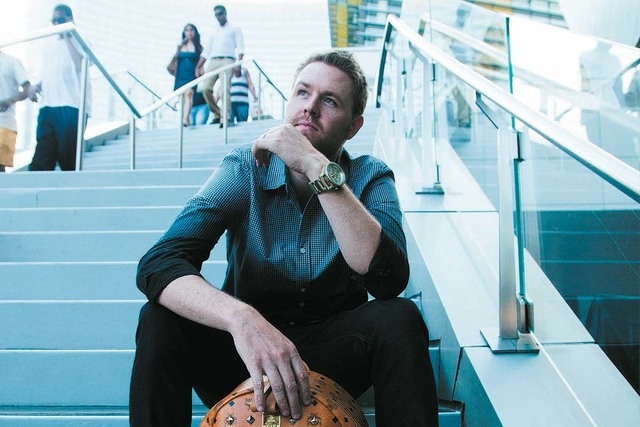Mixing and moving: Being a good DJ-producer tougher than it looks
Las Vegas’ DJ Ikon was in a nightclub some months ago when he watched a celebrity half-ass his way through a guest-DJ set. Ikon’s story goes like this:
“He uses everything right off his iPhone,” Ikon says of the star.
In other words, the celebrity (not a DJ by trade) picked songs off of his iPhone, then the celebrity’s assistant DJ did the actual work.
“He picks and plays the tracks, and the other DJ mixes over it,” Ikon (Aaron White) says.
That is the kind of story you expect to hear if you’re one of those anti-DJ people who decries the supposed lack of “real musicianship.”
I am not an anti-DJ person, because I love electronic dance music and I know more about DJs than you do. So with help from Ikon, let me explain the differences between A) good DJs, B) DJ-producers, and C) lazy DJs such as that celebrity who phoned it in.
(By the way, Ikon DJs Friday and Sunday at Bank and Thursday at Tryst.)
GOOD DJs
DJs such as Ikon still work hard to move a crowd and mix music. It’s the technology that has changed.
“You can come to the club with nothing more than headphones and a jump drive. You can spin eight hours with a 32 gig jump drive,” Ikon says.
“It’s definitely a far cry from when I started lugging four crates of records. You couldn’t even think about traveling. You had to condense your four crates in one crate just to be able to travel with them on a plane.”
Ikon is bummed that plenty of clubs don’t even have turntables anymore.
Instead, DJs use mixers and software on laptops. Sometimes you see DJs connect digital music to a double-CD player “turntable.” They don’t need to play actual CDs. Instead, they use their fingers to spin the horizontal CD holders (which look like little turntables) to mix and make effects.
It’s more complicated than that. But that’s the gist.
DJ-PRODUCERS
The most talented DJs in electronic dance music are the ones who create their own music in a studio (usually in their homes).
Ikon made a transition to produce his music in 2013, and he earned a little hit song, “Shadow of the Sun.”
Ikon is just 32. But he saw the writing on the wall.
“I don’t want to say you have an age limit, but being a DJ is like being a professional athlete. You get to a point where you age yourself out — or there’s a time frame where you can succeed just as a DJ.”
DJs who get into studio production are the ones who become international stars, be it Calvin Harris, Deadmau5 or Kaskade.
“Look at Benny Benassi,” Ikon says. “He’s like (in his 50s), and he and his brother are still putting out bangers. There’s no age limit on producing.”
So when you see a DJ-producer perform in a club — Deadmau5, Harris and many others — it’s like you’re watching a studio musician/studio engineer set up a portable shop in a club, to spin and remix his and other DJs’ hits live.
DJs and DJ-producers do not perform live as intricately as do traditional singers, guitarists, bassists, drummers or keyboardists.
But DJs are in clubs hours after midnight when people want to party, not sit to absorb a traditional concert.
LAZY DJs
Yeah, I see them. You can tell a lazy DJ because he or she has not done any work in a recording studio, and in person they just “push play,” as Deadmau5 famously said derisively two years ago.
“The technology of DJing is interesting,” Ikon says, especially when you think about how young people learn how to EDM DJ on software programs on computers, tablets — and even on their phones.
“The ability to mix one record to the other by your ear is completely irrelevant, because you have the sync button, where you can press it, and you just pick songs and move the cross fader right or left and it does everything for you.
“It’s a little more technical than that,” Ikon says. “But when I grew up, I was learning on records, where it took me five years of hard practice before I was like ‘I’ve got this,’ not five hours. But that’s technology, you know?”
To be clear, Ikon is not calling out DJs or calling them lazy. I am just explaining some things.
Contrary to what anti-DJ people think, DJs can be incredibly musically proficient. It’s just that those skills are often reserved for recording studios. DJ skills are more engineer-y.
Either way, making music in the studio, or playing it live in person, is fulfilling, Ikon says.
“Now I get excited as a producer the way I used to get excited as a DJ.”
Doug Elfman’s column appears on Page 3A in the main section on Mondays, Tuesdays, Thursdays and Saturdays. He also writes for Neon on Fridays. Email him at delfman@reviewjournal.com. He blogs at reviewjournal.com/elfman.















